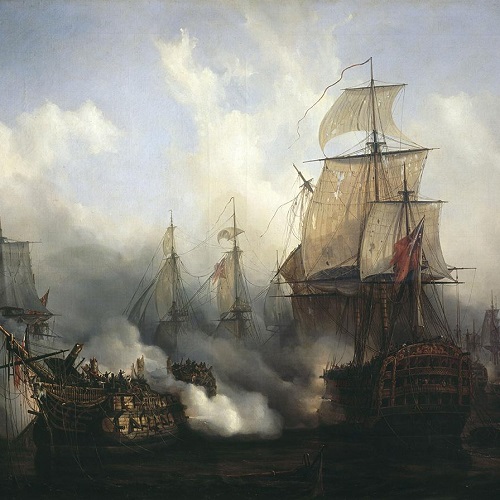Mercantilist Warfare
ABSTRACT
Warfare is an important and common subject in discussions on mercantilism. However, the idea of a mercantilist (type of) warfare rarely appears in the specialized literature. This article begins with a historiographical review of the uses of mercantilist warfare. It identifies mercantilist warfare has been used mostly as a name and not as a proper concept for social scientists. In the final section, I make the case for the usefulness of mercantilist warfare as a concept by providing an explicit definition and identifying four historical periods that highlight how mercantilist warfare changed over time: emergence (c.1500-c.1650), consolidation (c.1650-1815), hegemonic stability (1815-1871), and crisis (1871-1914).
KEYWORDS: Mercantilism, gunboat, naval warfare, violence
Chapter in Economic Warfare: Storia Dell’arma Economica, edited by Virgilio Ilari and Giuseppe Della Torre, 59–74. Quaderno SISM 2017. Roma: Società Italiana di Storia Militare.
Guerra Mercantilista
RESUMO
A guerra é um tema importante e comum ao discutir o mercantilismo. Entretanto, a ideia de uma guerra (de tipo) mercantilista raramente aparece na literatura especializada. Este artigo começa com uma revisão historiográfica dos usos de guerra mercantilista. Ele identifica que a guerra mercantilista tem sido usada em sua maioria como um nome e não de fato como um conceito para cientistas sociais. Na seção final, defendo o argumento da utilidade da guerra mercantilista enquanto conceito mediante o fornecimento de uma definição explícita e a identificação de quatro períodos históricos que destacam como a guerra mercantilista mudou ao longo do tempo: emergência (c.1500-c.1650), consolidação (c.1650-1815), estabilidade hegemônica (1815-1871) e crise (1871-1914).
Palavras-Chave: Mercantilismo, canhoneira, guerra naval, violência
Para citação:
Formato ABNT
References:
Barth, Jonathan. “Reconstructing Mercantilism: Consensus and Conflict in British Imperial Economy in the Seventeenth and Eighteenth Centuries.” The William and Mary Quarterly 73, no. 2 (2016): 257–90.
Baugh, Daniel A. “Naval Power: What Gave the British Navy Superiority?” In Exceptionalism and Industrialisation: Britain and Its European Rivals, 1688-1815, edited by Leandro Prados De la Escosura, 235–257. Cambridge: Cambridge University Press, 2004. http://www.amazon.com/Exceptionalism-Industrialisation-Britain-European-1688-1815/dp/0521189691/.
Blitz, Rudolph C. “Mercantilist Policies and the Pattern of World Trade, 1500–1750.” The Journal of Economic History 27, no. 1 (March 1967): 39–55. doi:10.1017/S0022050700070698.
Conti, Thomas Victor. “Guerras Capitais – um estudo sobre as transformações na competição econômica e na rivalidade política internacional: a Hegemonia da Grã-Bretanha, os Estados Unidos e a Alemanha de 1803 a 1914.” Dissertação de Mestrado, Universidade Estadual de Campinas, 2015. http://thomasconti.blog.br/masters.pdf.
Dales, J. H. “The Discoveries and Mercantilism: An Essay in History and Theory.” Canadian Journal of Economics and Political Science/Revue Canadienne de Economiques et Science Politique 21, no. 2 (1955): 141–53. doi:10.1017/S0315489000010343.
Gallie, W. B. “Essentially Contested Concepts.” Proceedings of the Aristotelian Society 56 (1955): 167–98.
Glete, Jan. Warfare at Sea, 1500-1650: Maritime Conflicts and the Transformation of Europe. Routledge, 2002.
Hanes, William Travis, and Frank Sanello. The Opium Wars: The Addiction of One Empire and the Corruption of Another. Illinois: Sourcebooks, Inc., 2004.
Magnusson, Lars G. Mercantilist Economics. Springer Science & Business Media, 2012.
Magnusson, Lars G. The Political Economy of Mercantilism. Routledge, 2015.
McDiarmid, Andrew. “Review of ‘The Political Economy of Mercantilism.’” Reviews in History, 2016. doi:10.14296/RiH/2014/1993.
Mitchell, B. R. International Historical Statistics 1750-2005: Europe, 2007.
Modelski, George, and William R. Thompson. Seapower in Global Politics, 1494–1993. Springer, 1988.
North, Douglass C., John Joseph Wallis, and Barry R. Weingast. Violence and Social Orders: A Conceptual Framework for Interpreting Recorded Human History. Cambridge University Press, 2009.
O’Brien, Patrick K. “The Nature and Historical Evolution of an Exceptional Fiscal State and Its Possible Significance for the Precocious Commercialization and Industrialization of the British Economy from Cromwell to Nelson.” The Economic History Review 64, no. 2 (2011): 408–46. doi:10.1111/j.1468-0289.2010.00538.x.
O’Brien, Patrick Karl. “Colonies in a Globalizing Economy 1815-1948.” Economic History Working Paper. London School of Economics and Political Science, Department of Economic History, 2004. http://econpapers.repec.org/paper/ehlwpaper/22484.htm.
O’Brien, Patrick Karl. “Intercontinental Trade and the Development of the Third World since the Industrial Revolution.” Journal of World History 8, no. 1 (1997): 75–133.
O’Brien, Patrick Karl. “Merchantilist Institutions for a First but Precocious Industrial Revolution; The Bank of England, the Treasury and the Money Supply, 1694-1797.” Economic History Working Paper. London School of Economics and Political Science, Department of Economic History, 2010. http://www.lse.ac.uk/economicHistory/workingPapers/2011/WP156.pdf.
O’Brien, Patrick Karl. “Provincializing the First Industrial Revolution.” Economic History Working Paper. London School of Economics and Political Science, Department of Economic History, 2006. https://ideas.repec.org/p/ehl/wpaper/22474.html.
O’Brien, Patrick Karl. “The Contributions of Warfare with Revolutionary and Napoleonic France to the Consolidation and Progress of the British Industrial Revolution,” 2011. http://eprints.lse.ac.uk/31741/.
O’Brien, Patrick Karl. “The Costs and Benefits of British Imperialism 1846-1914.” Past & Present, no. 120 (1988): 163–200.
O’Brien, Patrick Karl. “The Political Economy of British Taxation, 1660-1815.” The Economic History Review 41, no. 1 (1988): 1–32. doi:10.1111/j.1468-0289.1988.tb00453.x.
O’Brien, Patrick Karl, and Xavier Duran. “Total Factor Productivity for the Royal Navy from Victory at Texal (1653) to Triumph at Trafalgar (1805).” Monograph, February 2010. http://www2.lse.ac.uk/economicHistory/workingPapers/working_papers.aspx.
O’Brien, Patrick Karl, and Roland Quinault. The Industrial Revolution and British Society. Cambridge University Press, 1993.
O’Rourke, Kevin H., Leandro Prados de la Escosura, and Guillaume Daudin. “Trade and Empire.” In The Cambridge Economic History of Modern Europe, 1:96–120. Cambridge University Press, 2010.
Pincus, Steve. “Rethinking Mercantilism: Political Economy, the British Empire, and the Atlantic World in the Seventeenth and Eighteenth Centuries.” The William and Mary Quarterly 69, no. 1 (2012): 3–34. doi:10.5309/willmaryquar.69.1.0003.
Rich, E. E., and C. H. Wilson, eds. The Cambridge Economic History of Europe from the Decline of the Roman Empire: Volume 4, The Economy of Expanding Europe in the Sixteenth and Seventeenth Centuries. 1967. Reprint, CUP Archive, 2008.
Rodrik, Dani. “The New Mercantilist Challenge.” Project Syndicate, January 9, 2013. http://www.project-syndicate.org/commentary/the-return-of-mercantilism-by-dani-rodrik.
Rommelse, Gijs A. “An Early Modern Naval Revolution? The Relationship between ‘economic Reason of State’ and Maritime Warfare.” Journal for Maritime Research 13, no. 2 (2011): 138–50. doi:10.1080/21533369.2011.622889.
Schumpeter, Joseph Alois. History of Economic Analysis. Oxford University Press, 1954.
Stern, Philip J., and Carl Wennerlind. Mercantilism Reimagined: Political Economy in Early Modern Britain and Its Empire. Oxford: OUP, 2013.
Wallerstein, Immanuel. The Modern World-System I: Capitalist Agriculture and the Origins of the European World-Economy in the Sixteenth Century. 1974. Reprint, University of California Press, 2011.
Wilson, Charles. “‘Mercantilism’: Some Vicissitudes of an Idea.” The Economic History Review 10, no. 2 (1957): 181–88. doi:10.2307/2590856.
Wilson, Charles. Profit and Power. 1957. Reprint, Springer Netherlands, 1978.
Wilson, Charles. “Treasure and Trade Balances: The Mercantilist Problem.” The Economic History Review 2, no. 2 (1949): 152–61. doi:10.1111/j.1468-0289.1949.tb01118.x.


Deixe uma resposta